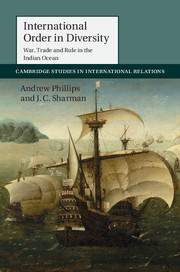Book contents
- Frontmatter
- Contents
- List of maps
- List of tables
- Acknowledgements
- Introduction
- 1 The puzzle of durable diversity in International Relations
- 2 The initial growth of diversity, 1500–1600
- 3 The expansion of diversity and competition under heteronomy, 1600–1650
- 4 The stabilization of diversity, 1600–1750
- 5 Reconfiguring diversity in the age of empire, 1750–1900
- Conclusion: Order in diversity
- Bibliography
- Index
- CAMBRIDGE STUDIES IN INTERNATIONAL RELATIONS
Introduction
Published online by Cambridge University Press: 05 May 2015
- Frontmatter
- Contents
- List of maps
- List of tables
- Acknowledgements
- Introduction
- 1 The puzzle of durable diversity in International Relations
- 2 The initial growth of diversity, 1500–1600
- 3 The expansion of diversity and competition under heteronomy, 1600–1650
- 4 The stabilization of diversity, 1600–1750
- 5 Reconfiguring diversity in the age of empire, 1750–1900
- Conclusion: Order in diversity
- Bibliography
- Index
- CAMBRIDGE STUDIES IN INTERNATIONAL RELATIONS
Summary
We live in an unusual age. For most of history, international systems have consisted of a bewildering diversity of political units, ranging from city-leagues through to feudal monarchies, confederacies and sprawling imperial realms. By contrast, ours is an insistently homogeneous era, the diversity of an earlier time now succeeded by a global monoculture of sovereign states. The sovereign state's universal triumph in the post-World War II era is too often seen as evidence of an inexorable historical logic, by which greater interaction between the world's political communities inevitably compelled a convergence in polity forms. The conviction that political communities will increasingly resemble one another as interaction between them rises is deeply ingrained in mainstream International Relations (IR) theories, even if scholars differ as to why this nexus between interaction and homogenization supposedly exists. From the vantage point of today's sovereign state monoculture, this equation of increased interaction with unit homogenization seems plausible. Against the wider backdrop of world history prior to 1945, however, it seems hopelessly parochial, ignoring the persistent heterogeneity in polity forms that has characterized global politics for the greater part of the modern era.
How can we account for the emergence, operation and persistence of durably diverse international systems? This is the central research puzzle we address in this book. Focusing specifically on the Indian Ocean region from 1500 to 1750 – the cradle of what has been dubbed ‘oriental globalization’ – we seek here to explain how and why interaction reinforced heterogeneity during the early modern era. Already the flywheel of trade between Africa, Asia and Europe from the middle of the first millennium of the common era, from the late fifteenth century onwards the Indian Ocean region saw a marked increase in both the diversity of its polity types, and the scale and frequency of interaction between them.
- Type
- Chapter
- Information
- International Order in DiversityWar, Trade and Rule in the Indian Ocean, pp. 1 - 21Publisher: Cambridge University PressPrint publication year: 2015



